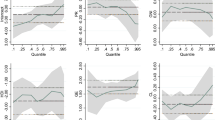Abstract
Getting a clear sense of the intensity and dynamics of corruption in a society or country is a critical platform for economic growth and development. This paper sets out to bring clarity to the study of corruption through an alternative approach. It examines and demonstrates how corruption can be evaluated by basically hinging it on the socio-economic development deaccumulation that any country can experience in different historical periods. The paper presents the socio-economic development desgrowth index (Ð-index), a new indicator with a complete set of mathematical tools that capture and calculate all the aspects that encompass corruption within a system or country. The paper successfully applied the (Ð-index) to X-ray the successive administrations of Guatemala from 1986 to year 2016 from where we convincingly observed the highs and lows in the corruption dynamics of Guatemala.

Similar content being viewed by others
References
Aidt, T.S.: Corruption, institutions, and economic development. Oxf. Rev. Econ. Policy 25(2), 271–291 (2009)
Bagolin, I., Comim, F.: Human development index (HDI) and its family of indexes: an evolving critical review. Rev. Econ. 34(2), 7–28 (2008)
Becker, G., Stigler, G.: Law enforcement, malfeasance, and compensation of enforcers. J. Leg. Stud. 3(1), 1–18 (1974)
Gyimah-Brempong, K.: Corruption, economic growth, and income inequality in Africa. Econ. Gov. 3(3), 183–209 (2002)
Huntington, S.P.: Political Order in Changing Societies. Yale University Press, New Haven (1968)
International Monetary Fund (IMF). www.imf.org. Accessed 1 May 2016
Klitgaard, R.: Controlling Corruption. University of California Press, Oakland (1991)
Lambsdorff, J.G.: Causes and consequences of corruption: What do we know from a cross-section of countries? In: Rose Ackerman, S. (ed.) International Handbook on the Economics of Corruption. Edward Elgar, Cheltenham (2006)
Leff, N.H.: Economic development through bureaucratic corruption. Am. Behav. Sci. 8, 8–14 (1964)
Procudaria de los Derechos Humanos de Guatemala (PDH). www.pdh.org. Accessed 15 Jan 2016
Rose-Ackerman, S.: Corruption: A Study in in Political Economy. Academic Press, New York (1978)
Ruiz Estrada, M.A.: Policy modeling: definition, classification and evaluation. J. Policy Model. 33(3), 523–536 (2011)
Ruiz Estrada, M.A., Yap, S.F.: The origins and evolution of policy modeling. J. Policy Model. 35(1), 170–182 (2013)
Shleifer, A., Vishny, R.W.: Corrup. Quart. J. Econ. 108(3), 599–617 (1993)
Sistema de Integracion Economica Centro Americana (SIECA). www.sieca.int. Accessed 25 Mar 2016
United Nations (UN). http://unstats.un.org/unsd/demographic/. Accessed 25 May 2016
World Bank. http://www.worldbank.org/depweb/english/modules/basicdata/datanotbasic.html. Accessed 25 June 2016
Author information
Authors and Affiliations
Corresponding author
Rights and permissions
About this article
Cite this article
Ruiz Estrada, M.A., Staniewski, M.W. & Ndoma, I. Evaluating corruption under the application of the SOCIO-economic development desgrowth index (Ð-index): the case of Guatemala. Qual Quant 52, 1137–1157 (2018). https://doi.org/10.1007/s11135-017-0508-5
Published:
Issue Date:
DOI: https://doi.org/10.1007/s11135-017-0508-5




